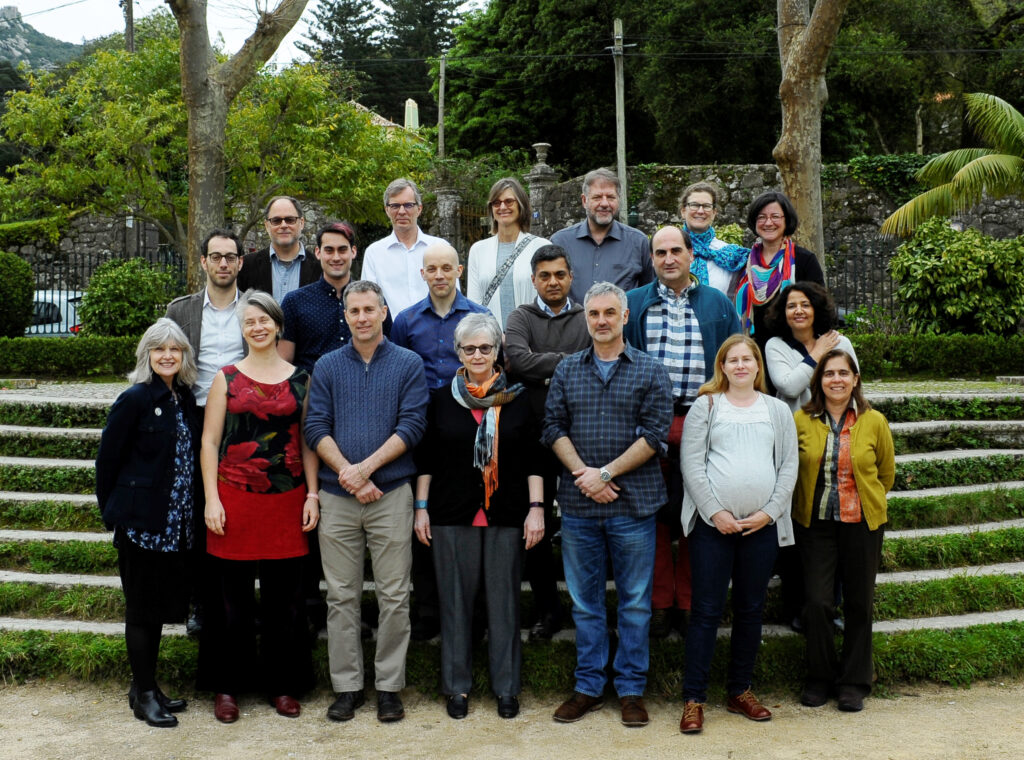Cultures of Militarism
Date
Mar 11-17, 2017Organized by
Catherine Besteman and Hugh GustersonLocation
Tivoli Palacio de Seteais in Sintra, PortugalPublications
Cultures of Militarism, Current Anthropology, Vol. 60, S19, February 2019.Participants
- Leslie Aiello Wenner-Gren Foundation, USA
- Ayse Gul Altinay Sabanci University, Turkey
- Catherine Besteman Colby College, USA
- Andrew Bickford George Mason University, USA
- Faisal Devji University of Oxford, UK
- Alex Fattal Penn State University
- Francisco Ferrandiz CSIC, Spain
- Daniel M. Goldstein Rutgers University, USA
- Hugh Gusterson George Washington University, USA
- Rema Hammami Birzeit University, Palestine
- Danny Hoffman University of Washington, USA
- Diane Nelson Diane Nelson
- Maria Clemencia Ramirez Columbian Institute of Anthropology and History, Columbia
- Brian Rappert University of Exeter, UK
- Tony Robben Utrecht University, Netherlands
- Scott Ross George Washington University, USA
- Erica Weiss Tel Aviv University, Israel
ORGANIZER’S STATEMENT: Anthropological interest in militarism has grown dramatically in recent decades. These years have seen the collapse of some Cold War client states, the proliferation of militia-led insurgencies, the increasing articulation of counterinsurgency abroad with domestic policing at home in many Western countries, the reformulation of the UN into an institution of militarized peacekeeping and occupation, and a growing awareness of the ways in which militarism as a set of cultural practices and ideologies pervades all domains of social life. The symposium aims to develop anthropological analyses of militarism as it is currently evolving both in the global north and south. We are particularly interested in the ways the new militarism inflects law, gender, subjectivity, social memory, knowledge production, popular culture, labor, and cultural constructions of security.
Militarism is a cultural system; it is shaped through ideology and rhetoric, effected through bodies and technologies, made visible and invisible through campaigns of imagery and knowledge production, and it colonizes aspects of social life such as reproduction, self-awareness, and notions of community. We seek to provoke conversations about militarism in its established and emergent forms, probing its genealogies, its facility at colonizing daily life, and its ability to present itself as a response to insecurities it has itself provoked.
The new militarism operates through a variety of legal and territorial regimes. Arrangements of occupation, as in Israel’s occupation of Gaza and the West Bank, coexist with the U.S. archipelago of hundreds of foreign military bases. Meanwhile the replacement of state militaries throughout the world with militarized non-state entities that may operate outside of national and international law, such as militias, private security contractors, pirates, and even NGOs is shifting militarism in some contexts from a set of state-sanctioned and controlled structures to a contested, often opaque, set of negotiations and confrontations between actors responding to the demands and desires of leaders who may or may not have any legal or official political recognition. How can we make sense of an emerging world order where powerful military entities are ascendant that may not represent the interests of states and who may not be responsive to international agreements concerning warfare? What is the role of law in this emergent world order?
We will also discuss the implications of new military technologies. These include drones and surveillance technologies that enable targeted killings and renditions outside of formally declared warzones, as well as technologies to shield and re-engineer the human body. Military practice is also inflected by new media technologies and the projects of memorialization they enable. How are militarized acts and atrocities recorded, analyzed, remembered, archived? What are the implications of the new relationships being forged in the US between military and popular culture creators, such as Hollywood films, video game companies, and toy companies? How does cultural production through military-entertainment professionals shape the militarization of knowledge, subjectivity, and cultural memory?
We would also like to explore the expansion of militarism into other social domains through the broad militarization of security, such as in policing, border security and migration, humanitarian interventions, and responses to natural disasters. Police forces in the US adopt heavy military materiel produced for war; US military forces train police forces in African and Middle Eastern countries; humanitarian interventions in the Balkans, Haiti, and African countries are now routinely conducted in collaboration with or through institutions run by military organizations; immigration control across southern Europe, the US-Mexican border, and in Israel makes increasing use of military technology, tactics, and practices to police the movement of people.
We aim for a symposium and, beyond that, an outstanding special issue of Current Anthropology that, while anchored in the perspective of anthropology, brings together in conversation analyses from different disciplines (including geography and political science), perspectives from the global south as well as the north, and analytic frames grounded in a range of epistemologies.
Current Anthropology supplement on the UCP website
Wenner-Gren Symposium #155
